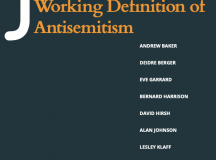Mosaic magazine ran four pieces in July 2021 focusing on the respective merits of the IHRA Definition of Antisemitism and the rival Jerusalem Declaration as resources in the fight against antisemitism and anti-Zionism. Joshua Muravchik, defending the IHRA, launched the debate with ‘The Emerging War Over Anti-Semitism’. Michael Walzer responded with ‘I’d Rather Ask “How Do We Win the Struggle against Anti-Zionism?” Than “Is this Anti-Semitic?”’ Ben Cohen and Kenneth Marcus subsequently joined the debate. In the exchange below Kathleen Hayes, whose ‘Antisemitism and the Left: A Memoir’, published in Fathom, has attracted much international attention, responds to the arguments made by Michael Walzer in Mosaic. Michael, whose most recent Fathom article was ‘The Danger of Greater Israel’, replies to Kathleen. Fathom’s own extensive debate on the IHRA Definition and the Jerusalem Declaration was published earlier in 2021.
Dear Michael,
I believed a lot of antisemitic garbage for many years. (I wrote about it for Fathom, here.) This is a huge source of shame, but it gives me one advantage over most opponents of antisemitism: I know how (at least some) antisemitic anti-Zionists think and feel. It’s for this reason that I’m putting aside my trepidation to write this. I have tremendous respect for you, but I question some of your reasons for preferring the Jerusalem Declaration on Antisemitism (JDA) for the US over IHRA’s Definition, and think I might be able to add something to the recent debate in Mosaic and Fathom. So I hope you’ll forgive me for wading in.
In your response to Joshua Muravchik in Mosaic, you emphasise that local conditions matter and say that while you support those calling for the IHRA definition in the UK, you prefer the JDA for the US. As an American-born veteran lefty who spent many years in the UK, however, I’m not convinced anti-Zionist antisemitism is qualitatively different in the two countries. It’s far more toxic in Britain certainly, particularly since Corbyn, but is it fundamentally different? I took part in anti-Israel demonstrations in both countries without noticing much significant difference beyond the participants’ accents. I think the same thing goes for BDS student groups, although there I have less personal experience. On either side of the Atlantic the theme is that Israel is racist, apartheid, Nazi and opponents of antisemitism need a working definition of antisemitism which recognises it often takes the form of vitriolic hostility to Israel. The JDA fails to do that, I think essentially for the reasons argued by Muravchik and Cary Nelson. A tool for identifying antisemitism is only as good as the people wielding it, but it should at least prompt the question ‘Could this be antisemitic?’ The JDA undercuts that process. It implicitly gives its imprimatur to anti-Zionist language and activity that at the very least might (and very likely does) reflect antisemitism. It serves to preclude the necessary reflection.
In your response to Muravchik you write that the IHRA definition encourages finger-pointing and that the way to win the argument is to listen and make effective counter-arguments. In your response to Nelson in Fathom, you write of ‘defending the Zionist project.’ Having been on the wrong side of the argument for many years, I think this is unrealistic. I agree with you in principle about finger-pointing, and think it’s generally not only counterproductive but wrong to declare individuals anti-Semites, unless they own the label. But the scenario you evoke is one where anti-Zionists and Zionists engage with each other in a rational manner. Nothing could be further from my experience and I doubt such civil exchanges happen much of anywhere. It isn’t possible. The anti-Zionist’s allegiance to her tribe prevents her not only from listening to what Zionists have to say, but reading them or even considering their perspective in the most private recesses of her mind. Zionism is the ultimate forbidden zone. I was particularly hardcore, and individuals may exist who (particularly in the early stages) will respond to reason and pedagogy. Once they’ve immersed themselves in anti-Zionist activism and settled into that community, however, I’d say it becomes fairly impossible to win them over by countering their beliefs about Israel. You’ll just end up in a rhetorical whack-a-mole.
So what is to be done, in my opinion? Hammer away about antisemitism. Use the word — don’t be afraid to say it because it will make people defensive. (It will.) By all means try to keep it civil, but make people uncomfortable by suggesting that, whatever their conscious feelings, their beliefs about Israel might be related to long-standing beliefs about Jews. They will almost certainly respond that bringing up antisemitism is just a way of smearing leftist supporters of the Palestinians. Keep saying it anyway. I am just one person and can’t vouch that others will respond the way I did in recognising and consciously breaking from antisemitism; but I suspect that for anyone to consider that she is horribly wrong about something this big and noxious, she has to have had her feet held to the fire in some way. For me it took being in Britain and having to confront the fact that Jeremy Corbyn, a man I admired, was facing charges of antisemitism virtually every day. Eventually the clamor was so loud that I concluded I’d better look into it (and as I wrote in my Fathom piece, coming to terms with Zionism was the very last piece to fall into place). In the US the issue of antisemitism is far less prevalent, which in a sense makes it harder because there’s less pressure on anti-Zionists to reflect, but I think the recipe is the same: talk about antisemitism, accuse where appropriate, make people ask ‘Could this be antisemitic?’ I think the IHRA Definition does a better job in raising that question where it so often comes up these days, in relation to Israel.
Thank you for your wonderful work and dedication to a refreshingly non-doctrinaire progressive politics. I hope you’ll take this in the comradely (a word I don’t often use these days) spirit in which it is intended. I wish you the best.
Yours,
Kathleen Hayes
Dear Kathleen,
I am grateful for your letter, and I am quite willing to say that you may be right—some of the time, maybe much of the time. But your experience is not mine. I have not had direct encounters with the anti-Zionist ‘tribe,’ but I know a lot about the Zionist tribe, being a longtime member, and some of us are definitely too quick to call our critics anti-Semites. You clearly don’t want to do that, but you do want to tell them, all of them, all the time, that they are playing dangerously with anti-Semitic tropes. But sometimes that’s just not an accurate description or a politic response.
A couple of examples. First: I am sitting and arguing with a small group of undergraduates who support one or another version of a BDS resolution (it may, for example, maybe only as a gesture, include a boycott of Egypt because of the Gaza blockade). The kids are focused on the post-’67 occupation, which they criticise in language no harsher than the language that I routinely use. My job is to explain to them that some of the leading BDSers believe that the occupation began in 1947; their political goal is the destruction of the Israeli state. Your own legitimate opposition to what is happening every day on the West Bank, I tell them, is different in kind and can be more effectively expressed—by supporting Peace Now, for example, or other more radical but still Zionist groups on the Israeli left. I also suggest that they should visit Israel. I don’t talk about anti-Semitism (half of them are Jewish).
Second example: I am talking with a farther left crowd of students, let’s say graduate students now, some of whom favor a unitary state ‘of all its citizens,’ and others, a bi-national state. These are sophisticated young people; they are quick to say that Turkey should grant the Kurds some kind of territorial autonomy and (one of them actually said) China should be a multi-national federal state with Tibet, Hong Kong, the Muslim Northwest, and maybe Taiwan among its parts. But they are focused on Israel now, they insist, because it is one of America’s closest allies, and so we (Americans) have influence there that we don’t have in, say, China. I tell them that their proposals would deny Jewish self-determination. They point out, smartly, that we (here in the US) are currently involved in a political struggle against White Christian self-determination—on behalf of an American state of all its citizens. I have answers to that; you probably know them: the Jewish case is different; the Middle East is far from America. But this is a serious argument and, again, I am not going to win it by talking about anti-Semitism (and, again, half the students are Jewish).
Maybe these are unusual examples; I visit elite universities; I have never been shouted down by a raucous band of violent Israel-haters; I am not involved right now in the down and dirty struggle against anti-Semitism. All that is true. And, you might go on to say, the IHRA definition would allow me to argue just as I do in cases like the two I’ve described–and many proponents of IHRA would join me. Yes, but many wouldn’t, and I need to distinguish myself from them if I am to get anywhere with the students who are still willing to sit down and talk with me.
That’s my story, and beyond that I really want to avoid the definitional wars.
With hope for your and our political success, Michael





































